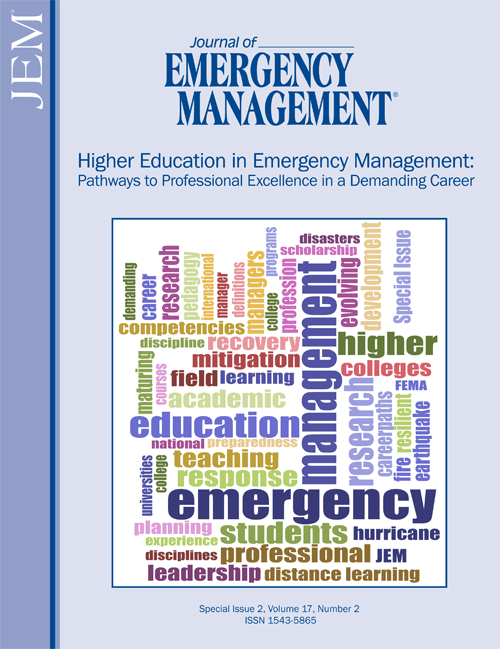Curricular innovation and emergency management in higher education: Making the general education connection
DOI:
https://doi.org/10.5055/jem.2019.0401Keywords:
emergency management, higher education, college curriculum, general education, distributed functionAbstract
Objective: As a distributed function, emergency management in higher education must involve students from outside the field. An introductory emergency management course was redesigned to be attractive and visible to nonmajors via approval for inclusion in the university’s core general education curriculum.
Design: Pre-/post comparisons were made of enrollment data for two interventions intended to broaden the course’s audience. Later, a survey assessed why students took the course.
Setting: A land grant research university serving over 14,000 undergraduate and graduate students.
Participants: Participants were students taking the Department’s introductory course.
Interventions: Two interventions involved the Department’s entry level course originally titled, “Introduction to Emergency Management” and numbered at the sophomore level. First, the Department retitled the course, “Emergencies, Disasters, and Catastrophes,” and renumbered the course at the freshman level. Second, the Department later requested and received approval to have the course accepted in the University’s general education curriculum.
Main outcome measures: Interventions were assessed by examining the average, annual number of nonmajors in the course, as well as, the academic diversity present among nonmajors.
Results: Both interventions, and especially the general education intervention, increased both enrollment measures.
Conclusions: A rapid approval for the course’s inclusion in general education validated faculty’s acceptance of emergency management as an academic discipline while each intervention increased both the number and academic diversity of nonmajors. Long-term, the result should prepare nonemergency management leaders for emergency management as a distributed function.
References
Cwiak C: Next steps in emergency management’s professionalization process: Who will be the gatekeeper of the profession of emergency management? In Hubbard J (ed): Challenges of Emergency Management in Higher Education: Planning and Strategies, Fairfax VA: Public Entity Risk Institute, 2011, pp. 9-18.
Cwiak C, Goss K: Professionalization. In Trainor J and Subbio T. (eds): Issues in Disaster Science and Management: A Critical Dialogue. Washington, DC: Federal Emergency Management Agency, Higher Education Program, 2014, pp. 393-427.
Jensen J: The argument for a disciplinary approach to emergency management higher education. In Hubbard J (ed): Challenges of Emergency Management in Higher Education: Planning and Strategies. Fairfax, VA: Public Entity Risk Institute, 2011, pp. 19-46.
Jensen J: Report of the Disciplinary Purview Focus Group: Scholarship and Research to Ground the Emerging Discipline of Emergency Management. Federal Emergency Management Agency, Higher Education Project. Available at http://training.fema.gov/emiweb/edu/, 2013. Accessed June 12, 2017.
Jensen, J: Report of the Disciplinary Focus Group: Purview and Core Research Questions for the Academic Discipline of Emergency Management. Federal Emergency Management Agency, Higher Education Project. Available at http://training.fema.gov/emiweb/edu/, 2012. Accessed June 12, 2017.
Jensen J: Results from a Survey Gauging Emergency Management Higher Education Community Consensus on Key Points Related to the Disciplinary Identity of Emergency Management. Federal Emergency Management Agency, Higher Education Program. Available at http://training.fema.gov/emiweb/edu/, 2014. Accessed June 12, 2017.
Jensen J: Results from a Survey Gauging Emergency Management Higher Education Community Consensus on Key Points Related to Research Standards for the Discipline of Emergency Management. Federal Emergency Management Agency, Higher Education Program. Available at http://training.fema.gov/emiweb/edu/, 2014. Accessed June 12, 2017.
Jensen J, Bundy S, Thomas B, et al.: The county emergency manager’s role in recovery. Int J Mass Emerg Disasters. 2014; 32(1): 157-193.
Cwiak C: The 2016 FEMA Higher Education Program Survey. Federal Emergency Management Agency, Higher Education Program. Available at http://training.fema.gov/emiweb/edu/, 2016. Accessed June 12, 2017.
NA: The College List. Federal Emergency Management Agency, Higher Education Program. Available at http://training.fema.gov/emiweb/edu/, 2017. Accessed June 12, 2017.
Phillips B: Disasters by discipline: Necessary dialogue for emergency management education (paper presented at the Creating Educational Opportunities for the Hazards Manager of the 21st Century workshop, Denver, CO: October 22-24, 2003.
Pittman E: Will general education courses shape the future of emergency management? Emergency Management. Available at http://www.govtech.com/em/training/Will-General-Education-Courses-Shape-Emergency-Management.html. Accessed October 24, 2014.
Adams R: Criminal justice: An emerging academic profession and discipline. J Criminal Justice. 1976; 4: 303-314.
McEntire D (ed): Disciplines, Disasters and Emergency Management: The Convergence and Divergence of Concepts, Issues and Trends from the Research Literature. Springfield, IL: Charles C Thomas Pub Ltd., 2007.
Klenow D, Youngs G: Developing and enhancing emergency management programs at the undergraduate level. In Hubbard J (ed.): Integrating Emergency Management Studies into Higher Education: Ideas, Programs, and Strategies. Fairfax, VA: Public Entity Risk Institute, 2010, pp. 85-93.
Federal Emergency Management Agency. A Whole Community Approach to Emergency Management: Principles, Themes, and Pathways for Action. Washington DC: Federal Emergency Management Agency. Available at https://www.fema.gov/medialibrary-data/20130726-1813-25045-0649/whole_community_dec2011__2_.pdf, 2011. Accessed June 12, 2017.
Published
How to Cite
Issue
Section
License
Copyright 2007-2025, Weston Medical Publishing, LLC and Journal of Emergency Management. All Rights Reserved.






